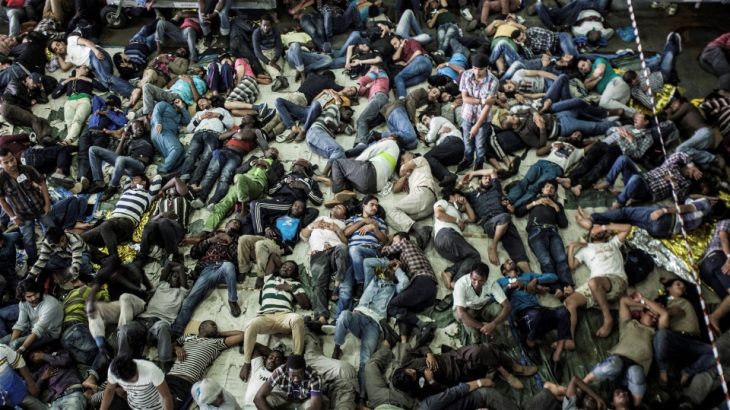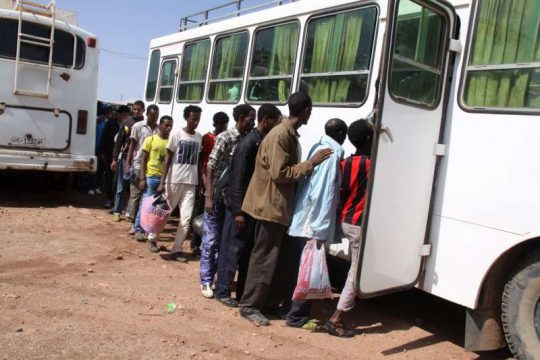In June, an inquiry commission of the United Nations Human Rights Council (UNHRC) published a 500-page report detailing how Eritrea, under Isaias Afwerki's iron-fisted regime for the past 22 years, has created a repressive system in which people are routinely arrested at whim, detained, tortured, killed or go missing.
On July 2, the UNHRC extended the commission’s mandate to investigate whether such abuses could constitute crimes against humanity.
The commission did not get permission from the Eritrean government to visit the country, and its requests for information did not receive a reply, according to the commission.
Mike Smith of Australia is chairman of the three-person UNHRC commission of inquiry on Eritrea. He spoke to JusticeInfo.net (interview extracts below).
JusticeInfo.net: What kind of crimes do you talk about in your first report?
Mike Smith: We say that there are a range of human rights abuses which derive very largely from the fact that there is no real rule of law in the country. There is no independent court that people who have their rights abused can appeal to, there is no independent legislature. (…) That can lead to examples of torture, arbitrary detention, it can mean that anyone who criticizes or raises a question about policy can put themselves in jeopardy of being arrested, imprisoned for indefinite terms. Very often people who have been in prison don’t know why they are there, they don’t know how long they are going to be in prison. Sometimes they are there for weeks, sometimes they are there for years.
Then there is national service. Having originally set up a system whereby everyone at the age of 17 or 18 would go into national service for 18 months, that was extended in effect to an open-ended commitment. Many people find that they go and do their military training at that age but then are never released. We came across examples of people who had been in the military for 10 years or 15 years before they finally got so fed up they walked across the border. We’re talking about a pervasive system of control and authority that impacts on people’s enjoyment of their rights in a whole range of areas, and that includes that in prisons, in detention, people are very badly ill-treated and on occasions are tortured. And torture is one of those sorts of crimes that, if it is pervasive and if it’s part of a government policy, can be classified as a crime against humanity.
JusticeInfo.net: The Eritrean government says it’s all lies. How can you investigate properly when the government won’t let you in?
MS: We basically travelled around to places where there are significant Eritrean communities and asked people to come in and talk to us and tell us what happened to them. (…) We interviewed more than 550 people for the report and we got story after story. When you put them all on top of each other you get a picture that builds up of the way the country is operating and the way the systems operate. Every story is different because every story is personal, but you can see the common elements and you can see where people despair. So it’s building on that we drew conclusions in all these areas, about the legal system, about national service and the way that works, about sexual abuse in that context, about torture in the military and in the detention centres, about the complete lack of freedom of opinion and expression, people being arrested just for making a mild criticism of some administrative matter, the fact that there’s no free press there, any journalist that writes something mildly critical is likely to be arrested, and so on. (…)
On top of that there is what you might call circumstantial evidence, which is that there is a very steady stream of people leaving the country, and they’re leaving the country, they say, because they’re fleeing from a system that gives them no hope and is crushing their freedom of choice. (… ) Eritreans are the second largest group after Syrians in the current asylum seeker wave. Syria is a country in full civil war, Eritrea is not. Eritrea is a country of between 3 and 6 million people, Syria is a country of 20 million. So the proportions are quite stark in the sense that this is a country that is bleeding a lot of particularly young people, and yet it’s not even in conflict, so something is obviously wrong.
JusticeInfo.net: Do you fear for the security of people that testified for you or that will testify for you?
MS: The commission of inquiry on North Korea held open hearings in a number of places, and people stood up and gave their testimony in public, which was streamed on the Internet and so on. We gave strong consideration to that because it’s a very powerful way of gathering this evidence. But we concluded that it was simply too dangerous to do that. There is no question that people are threatened by the government, that the government has conducted reprisals against families of activists and so on back in Eritrea. And therefore we didn’t think that it was a responsible thing to do. Rather, we have gone to great lengths to protect the names and identities of those who have given us testimony. Now that means, of course, that we can be challenged and that people can say you’ve made all this up, you don’t have the name of the person who told you that, and we accept that might mean that our case is not as strong as it would be, but it’s simply too dangerous to do otherwise. So we’re pretty confident that we can protect the people who have spoken to us, and that is a number one priority.
JusticeInfo.net: And if you find that there have been crimes against humanity, what would be the next step?
MS: Well first of all, we are not a judicial body, so we can’t actually find that. What we can do is we can gather enough information that we can recommend to the Human Rights Council and to other bodies that there is a likelihood that this has happened. In those circumstances, the issue can be taken up by the Security Council, because the Security Council could then refer cases to the International Criminal Court, and then you would have prosecutors from the ICC who would review the evidence and decide if they were going to try and charge individuals. Now the challenge for us of course is that crimes against humanity can be based on institutional things but in order to bring about some accountability you’ve got to link it to actual individuals and at the moment that is very difficult, particularly when, as you said earlier, we don’t have access to the country and to the records of activities, to the names of people who made particular decisions. But we’ll do the best we can, that’s the challenge we face over the next seven or eight months.







